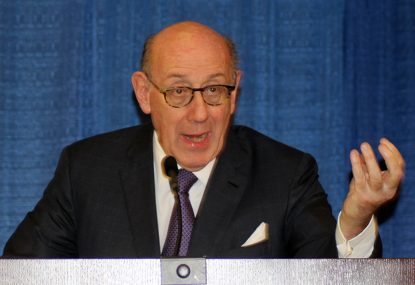More than $19.6 million has been paid by the Archdiocese of Philadelphia to 93 people making a claim for compensation due to clergy sexual abuse under the Independent Reconciliation and Reparations Program (IRRP) since it began in November 2018, according to a report by the program’s Oversight Committee released June 3.

Kenneth Feinberg, a co-administrator of the Independent Reconciliation and Reparations Program of the Archdiocese of Philadelphia, speaks during a press conference Nov. 13, 2018 in Philadelphia. (Photo by Matthew Gambino)
The program is administered by lawyers Kenneth Feinberg and Camille Biros — who also are running similar programs in numerous dioceses in Pennsylvania, New Jersey and New York — who consider claims and their eligibility, then make judgments for monetary awards without input or appeal by the archdiocese, which has pledged to pay all approved claims.
To date, 167 individuals have filed claims and 93 of them were awarded amounts averaging more than $211,000 per claimant, for a total of $19.63 million, according to the second interim report from the program. The first report was issued in February of this year.
“All claimants are also being offered various forms of counseling and other non-financial support to address the suffering and trauma they have been forced to endure by prior acts of abuse,” the new report read.
The IRRP’s Victim Support Facilitator Lynn Shiner provides emotional support, help in answering questions on the claim form and help finding community care resources for abuse victims as requested, all independent of the archdiocese.
[hotblock]
The archdiocese has pledged to pay all compensation amounts both individually and in sum, without a monetary cap. Officials planned to put up $25 million to $30 million for initial funding, and to borrow against internal church funds as needed to pay additional claims.
In November information packets were mailed to 352 previously known people who had made a claim of sexual abuse against a priest of the Philadelphia Archdiocese. The program excludes claims against lay employees of the archdiocese and against members of religious orders.
Of the 352 people, 187 were eligible to file a claim, 61 were ineligible and the eligibility of 11 were yet to be determined, for a total of 259 people registered as of May 29. Of the 197 filing a claim, 93 of them were determined to be eligible for a claim and four ineligible.
Publicity about the reparations program appears to have fueled inquiries about it from victims. The total number of people registering for the program and claims determined to be eligible all rose in the program’s second quarter, Feb. 15 to May 29.
Data from the report indicate “the success of the program and the archdiocese’s efforts to make the public aware of the program and encourage all who may have claims to come forward,” the report read.
The current statutes of limitation in Pennsylvania prevent most survivors of clergy sexual abuse from suing the Philadelphia Archdiocese for civil damages.
Under the rules of the IRRP, abuse victims who accept the monetary award for their claim are required to agree not to bring a further lawsuit against the archdiocese for additional claims.
[tower]
But many people are accepting offers by the program administrators to speak confidentially about their experience and their claim. The report said 61 meetings with administrators have been held to date.
Shiner, the victim support facilitator, not only has worked with 56 claimants and engaged in 150 communications and support sessions, she has also “organized and facilitated discussions between two victims and Archbishop Charles Chaput,” according to the report. “(T)hese meetings gave them the opportunity to share their experiences, express their thoughts and concerns, and seek spiritual guidance from Archbishop Chaput.”
These people, the report said, were grateful to the program’s administrators “for the acknowledgement and validation … that they were victims of the stated abuse.”
The IRRP calls for Shiner to review current archdiocesan policies regarding victim support and outreach, and for the Oversight Committee to review policies related to preventing, reporting and investigating alleged abuse in order to “establish best practices for the archdiocese to better serve the community as a whole,” the report read.
In their preliminary review, the administrators said “these policies generally have been found to be sound,” though the review is ongoing and the next report, expected to be issued in August, will describe further progress.
Meanwhile the process for accepting new claims and deciding on awards continues, but a deadline is approaching.
Claimants who have not already registered on the program website must do so by July 31 – visit the website here.
Claims must be postmarked by Sept. 30, and program administrators expect the pace of filing to quicken as that deadline nears.
They intend to continue to reach out to the 232 people who previously notified the archdiocese of a claim of sexual abuse but have not yet filed a claim with the IRRP.
PREVIOUS: Laity can lead the way in renewing the church, speaker says
NEXT: St. Gabriel’s keeps marriage all in the (parish) family



Share this story